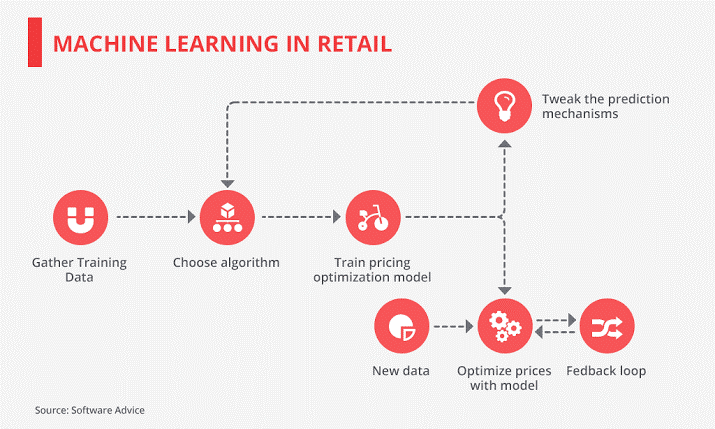
Click to learn more about author Chirag Mudsa.
New technologies are continuing to make retail stores smarter. Among the latest range of smart and futuristic technologies for retail stores, artificial intelligence and machine learning have the most paradigm-shifting capabilities. While the underlying fear of job loss thanks to these technologies is still there, no one can deny the massive value addition A.I. and ML can make in the retail industry.
Here in this blog post we are going to explain the role of these two technologies on the retail sector, along with the challenges and opportunities.
Reinforcement Learning: ML for Retail Industry
Thanks to the exposure ML is having to large-scale data collection and analytical tools, providing real-time insights about customers and businesses became easier than ever before. This also gave rise to several autonomous branches of ML. One of them is reinforcement learning (RL) which is basically about learning individual customer behaviors and predicting customer responses to company ads and marketing.
This branch of ML called RL can actually focus on user actions in specific contexts. The most important thing in this respect is to train the RL algorithms for specific problem solving. Such algorithms focus on coming up with the ideal decision as per the options available.
The ultimate advantage of RL is determining the user characteristics. While standard ML deals with set rules for handling the options in every possible scenario, RL can adapt faster as per the shifting environment following every customer action. Therefore, for real-time customer targeting, RL comes as the most dynamic solution for retailers.
Unlike standard ML, where agents behave according to set rules for each possible scenario, RL rewards aren’t instant and the environment shifts after every action. As a result, maze boundaries aren’t fixed, and agents learn how to act for themselves, using rewards to create optimal strategies for reaching a final objective. And this makes RL a perfect foundation for real-time ad targeting in today’s dynamic retail landscape.

Inventory Management Got A Boost with Machine Learning
In the retail sector, managing stock and inventory is a key concern area. Thanks to ML technology retail inventory management received a huge boost to ensure supply and delivery of products just when the stores need them. When this delivery is further optimized based on the retail locations, the productivity is ensured further. Let us have a quick look at the keyways stock and inventory management can be helped by ML technology.
- Retailers with active ML-based inventory management can get supplies where they are needed most.
- A smart dashboard can inform stock managers about the real-time stock updates.
- Camera systems in retail stores by using ML can update the retail software about stock and inventory needs.
- Access to the detailed inventory and stock data helps inventory managers to deal with sudden sales increases or slowdowns and accordingly ensure supply of stocks.
- ML for mobile apps has opened another vista of opportunities for retailers as the stock and inventory managers can track the product movement right on their handheld screen.
Predictive Retail Marketing
The data-driven technologies have proven expertise in the sales prediction and forecasting. For the retail industry, it has tremendous significance. ML further boosts this forecasting capability in many ways. When an ML-based algorithm is provided with a huge volume of customer and business data, it is not only capable of finding the fault lines in the business process, but it can also predict the marketing outcome and sales. From predicting business conversion to customer footfall to actual revenue output, an ML-based algorithm boasts a range of forecasting capabilities.
A retail store, thanks to this precision-driven prediction about the business output and sales, can actually take a whole array of proactive measures that can boost the utilization of resources while creating more scope of pushing sales. For instance, based upon the input of an ML-based algorithm, the retail store can move expensive stock to reduce unnecessary overhead cost. On the other hand, the input of an ML-based algorithm can also help retailers ensure steady supply where product movement is higher.
Product Launching Strategies Backed by Data
When a retail store has access to most relevant data-driven insights, decision-making on various aspects of the product launch gets better. The promotion and pricing of products depend on a whole array of complicated factors including customer behavior with different brands.
Secondly, for product launch retailers need to decide on the crucial aspect of pricing. Most retailers make the mistake of keeping product prices either too low or too high and this often makes them either lose sales or revenue earnings. Instead of human decisions, if product pricing is taken care of by the ML algorithm, the possibility of human errors will be reduced to a minimum. Based on the customer’s purchase history, demographics, market trends, customer behavior, customer-preferred promotional offers, and several other data points, an ML-based algorithm can prescribe precisely effective pricing for each product.
ML helps retailers in a multitude of ways to predict the buying habits of their customers in different contexts and times of need. Retailers based upon these data-driven insights can actually adjust and tweak their marketing strategies. As customers increasingly prefer retailers who understand their individual needs, product launching strategy of companies is bound to benefit from ML.
Conclusion
From the above-mentioned explanation, it is quite clear that ML is transforming the retail industry and the shopping experience beyond recognition. While human beings will still be irreplaceable in the retail outlets, ML can optimize the utilization of the resources and ensure more precision-driven decision- making. Since ML enhances customer experience in a multitude of ways, no retailers in the future can shy away from it.
